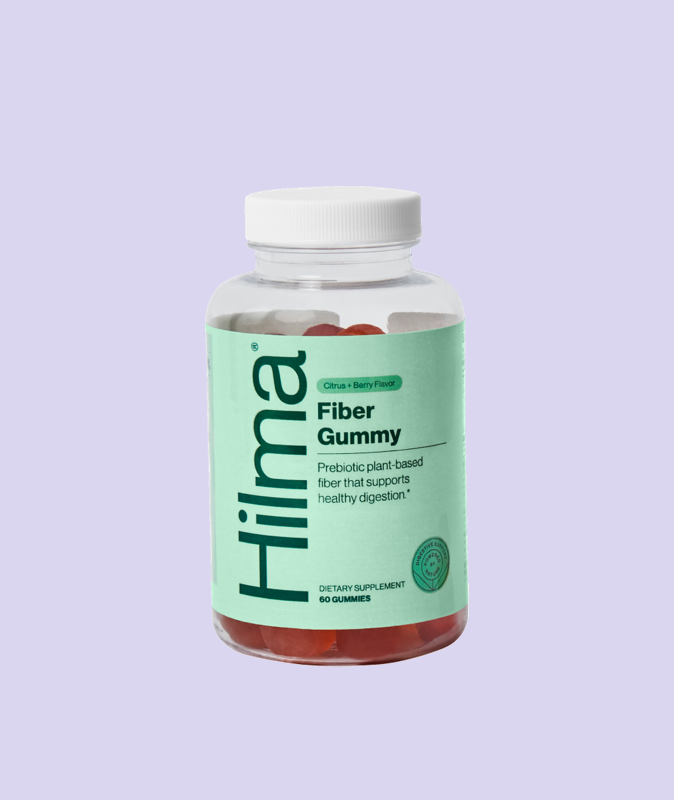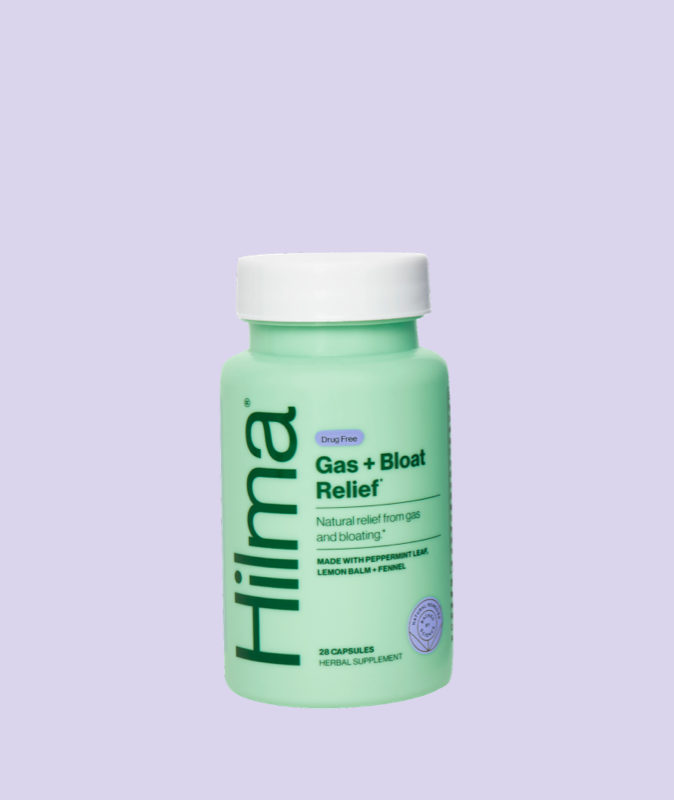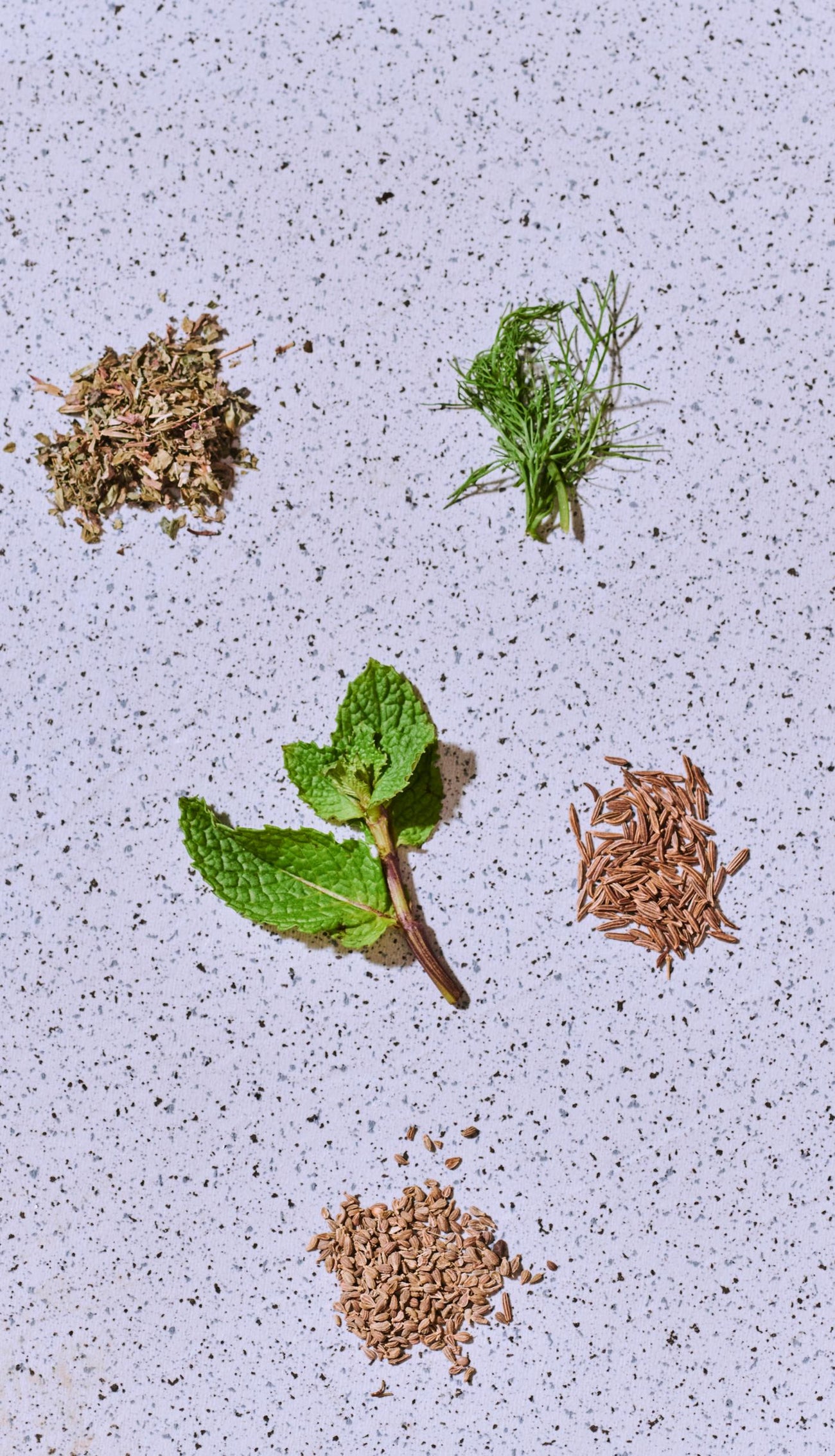
Bloating after eating is not only uncomfortable but also more common than you might think. Here at Hilma, we know it’s a puzzling and often frustrating experience that many of us encounter regularly. But why does this happen, and more importantly, what can we do about it?
In this article, we’ll dive into the dietary culprits that could be causing bloat, explore how everyday habits contribute to bloating, and share some natural strategies to help you say goodbye to that post-meal discomfort.
What Are Common Dietary Causes of Bloating After Eating?
Bloating can sneak up on you, turning a great meal into an uncomfortable evening. Knowing what triggers this common discomfort is the first step to managing it effectively.
Overeating
It's a simple truth that too much of a good thing can be bad, especially when it comes to food. Overeating is one of the most straightforward causes of bloating. Your stomach struggles to process large amounts, leading to temporary distension.
High-Fiber Foods
Fiber is fantastic for your digestive health, but the flip side is that it can also lead to bloating, especially if your body isn’t used to processing large amounts of it. Foods rich in fiber, like whole grains, lentils, and some vegetables, can cause gas and bloating as they are fermented by bacteria in your large intestine.
Fatty Foods
Rich, fatty meals can make you feel bloated as they linger longer in the stomach. This delay can cause a buildup of gas, leading to that bloated feeling. While fats are an essential part of a healthy diet, balancing them with other nutrients can help keep bloating at bay.
Food Intolerances
Food intolerances are a common cause of bloating and gas. Common culprits include dairy products, gluten, and certain types of carbohydrates like fructose and sorbitol.
These can lead to excessive gas production and bloating as the body struggles to digest them properly. Identifying and managing these intolerances with the help of a healthcare provider or dietitian can significantly reduce symptoms.
What Lifestyle Factors Can Cause Bloating After Eating?
While diet plays a significant role in how we feel after eating, our lifestyle choices can also contribute to bloating. Some everyday habits may be influencing your digestive comfort more than you realize.
Eating Habits
Rapid eating or not thoroughly chewing food can lead to bloating. When you eat too quickly, you're likely to swallow air, which can accumulate in your digestive tract and cause discomfort. Slow down and savor your meals; it helps your stomach to digest food more efficiently and can prevent the buildup of excess gas.
Chewing Gum or Using Straws
Both chewing gum and sipping through a straw introduce air into your digestive system. While it might seem minor, this extra air can significantly contribute to bloating and abdominal discomfort. If you're prone to bloating, consider limiting these habits to see if your symptoms improve.
What Medical Conditions Can Cause Bloating After Eating?
Certain health conditions can also predispose individuals to experience bloating more frequently. Recognizing these can be key to addressing and managing the root cause of your bloating effectively.
Irritable Bowel Syndrome (IBS)
IBS is one of the most common causes of bloating and affects a significant number of people. This condition disrupts the normal digestive process, leading to symptoms such as bloating, gas, abdominal pain, and changes in bowel movements. Managing IBS often requires a comprehensive approach, including diet changes, stress management, and sometimes medication.
Small Intestinal Bacterial Overgrowth (SIBO)
SIBO occurs when there is an abnormal increase in the overall bacterial population in the small intestine, particularly types of bacteria not commonly found in that part of the digestive tract. This overgrowth can lead to bloating, as well as pain and diarrhea, and is often treated with specific antibiotics and diet modifications.
Celiac Disease
Celiac disease is an autoimmune disorder triggered by gluten—a protein found in wheat, barley, and rye. Ingesting gluten causes an immune response that damages the small intestine's lining, leading to bloating, gas, and severe health issues over time. The only effective treatment is a strict gluten-free diet.
Constipation
Frequent constipation can cause bloating and abdominal discomfort as waste material builds up in the intestines. Ensuring adequate fiber intake, drinking plenty of water, and regular physical activity can help maintain bowel regularity and reduce the risk of bloating associated with constipation.
How To Prevent Bloating After Eating
Preventing bloating isn't just about addressing it when it happens; it's about creating a lifestyle that minimizes its occurrence in the first place.
Here are some proactive steps you can take to maintain your digestive health and reduce the chances of bloating after meals:
Adopt a Balanced Diet
Incorporating a variety of nutrients in your diet can significantly impact your digestive health. A balanced diet includes a mix of fruits, vegetables, whole grains, proteins, and healthy fats. This diversity provides your body with essential nutrients and supports a healthy gut microbiome, reducing the likelihood of bloating.
Follow Regular Meal Times
Eating at regular intervals can help regulate your digestive system's natural rhythms. Try to eat your meals at the same times each day to help your body develop a consistent digestive routine. This regularity can enhance digestion and reduce instances of bloating and other gastrointestinal discomforts.
Avoid Triggering Foods
If you notice certain foods exacerbate your bloating, it might be wise to avoid them. Common culprits include high-lactose dairy products, fatty foods, and high-FODMAP foods like onions, garlic, and beans. Identifying and eliminating these triggers can provide considerable relief from bloating.
Stay Hydrated
Drinking plenty of water throughout the day helps keep the digestive system running smoothly and can aid in the proper digestion and passage of food. Water is particularly effective in preventing constipation, a common cause of bloating. Aim for about eight glasses a day, but remember that needs can vary based on activity level and personal health.
Chew Thoroughly
Taking the time to chew your food thoroughly is one of the simplest and most effective ways to prevent bloating. Chewing breaks food down into smaller particles, which makes it easier for your stomach to digest and reduces the likelihood of gas buildup.
Regularly Exercise
Physical activity is great not just for your overall health but also for your digestive system. Regular exercise helps stimulate the intestinal muscles, improving your digestive tract's efficiency and helping to prevent bloating. Even a daily walk or some gentle yoga stretches can make a difference.
What Are Natural Remedies for Bloating After Eating?
If you're looking for gentle, effective ways to alleviate bloating, natural de-bloating remedies can be a wonderful addition to your wellness toolkit. These solutions harness the power of nature to soothe and support your digestive system, often with fewer side effects than over-the-counter options.
Ginger and Peppermint Teas
Tea is a time-honored remedy for many digestive issues, including bloating. Peppermint tea, for instance, is highly praised for its ability to relax the digestive tract muscles, thereby easing bloating and gas.
Similarly, ginger tea can help stimulate digestion and relieve nausea. Sipping a warm cup of herbal tea after meals can promote a smooth digestive process and prevent discomfort.
Probiotic and Fermented Foods
Probiotics and fermented foods like yogurt, kefir, and sauerkraut introduce beneficial bacteria into your digestive system. These microbes help balance your gut flora, which is crucial for digestion and can reduce bloating.
For those looking for a more direct approach, our Daily Pre + Probiotic + Herbs provides a balanced blend of probiotics and prebiotics along with soothing herbs designed to support a healthy microbiome and soothe digestive discomfort, making it an excellent choice for daily gut health maintenance.
Supplements
Sometimes, even with the best diet, we might need a little extra help. Supplements can fill gaps in our nutrition and offer concentrated doses of essential nutrients and botanicals to support digestive health. For example, digestive enzymes can help break down foods that typically cause gas and bloating, while magnesium supplements can support bowel regularity.
Our Fiber Gummy is an excellent supplement for those looking to enhance their fiber intake without the risk of added bloating that some high-fiber foods can cause. With its easy-to-digest formula, it supports regularity and a healthy gut environment.
Additionally, for more acute bloating issues, our Gas + Bloat Relief formula offers a powerful blend of herbs designed to soothe bloating quickly and effectively. It's the perfect go-to remedy for those times when you need fast relief from discomfort caused by gas or bloating, whether after a big meal or during stress-related digestive upsets.
We hope these tips help you find relief from bloating and enhance your digestive wellness. Explore our range of natural remedies tailored to support a healthy, balanced gut. Because at Hilma, we believe everyone deserves to feel good after they eat. Check us out and discover your path to digestive health!
This information is for educational purposes only and should not be taken as medical advice. Please consult a physician before treating any disorder.
Sources:
Bloated Stomach: Causes, Tips to Reduce & When to be Concerned | Cleveland Clinic
Food Intolerance: Symptoms, Causes and Treatment Options | Cleveland Clinic
Irritable Bowel Syndrome Overview | Mayo Clinic
Diet, fluid and exercise | Coping physically | Cancer Research



